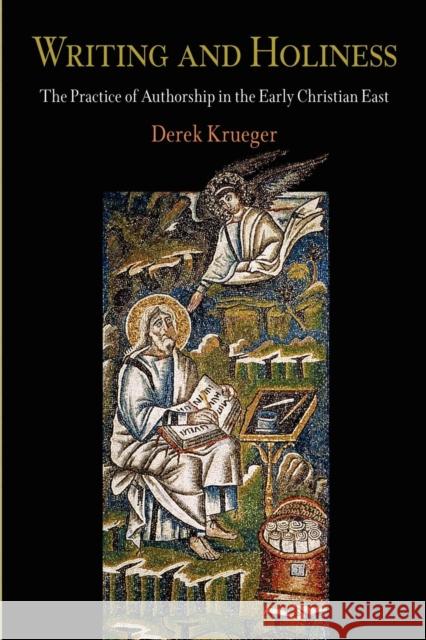Writing and Holiness: The Practice of Authorship in the Early Christian East » książka
Writing and Holiness: The Practice of Authorship in the Early Christian East
ISBN-13: 9780812221473 / Angielski / Miękka / 2011 / 312 str.
Writing and Holiness The Practice of Authorship in the Early Christian East Derek Krueger "Lucid, innovative, beautifully written, a real contribution not just to the scholarship of the early Byzantine world but to conceptions of authorship and composition on a theoretical plane."--Margaret E. Mullett, Queens University Belfast "A provocative, stimulating, and complex book, which will reward a close reading by advanced students of Greek hagiography."--Speculum "A delight to read. Erudite yet accessible. . . . A coherent reading of the practice of hagiographical writing as an ascetic tradition which both celebrated the author as creator and placed him in the context of a scribe whose task was to record less his own view of holiness than heavenly insights."--Mystics Quarterly Drawing on comparative literature, ritual and performance studies, and the history of asceticism, Derek Krueger explores how early Christian writers came to view writing as salvific, as worship through the production of art. Exploring the emergence of new and distinctly Christian ideas about authorship in late antiquity, Writing and Holiness probes saints' lives and hymns produced in the Greek East to reveal how the ascetic call to imitate Christ's humility rendered artistic and literary creativity problematic. In claiming authority and power, hagiographers appeared to violate the saintly practices that they sought to promote. Christian writers meditated within their texts on these tensions and ultimately developed a new set of answers to the question "What is an author?" Each of the texts examined here used writing as a technique for the representation of holiness. Some are narrative representations of saints that facilitate veneration; others are collections of accounts of miracles, composed to publicize a shrine. Rather than viewing an author's piety as a barrier to historical inquiry, Krueger argues that consideration of writing as a form of piety opens windows onto new modes of practice. He interprets Christian authors as participants in the religious system they described, as devotees, monastics, and faithful emulators of the saints, and he shows how their literary practice integrated authorship into other Christian practices, such as asceticism, devotion, pilgrimage, liturgy, and sacrifice. In considering the distinctly literary contributions to the formation of Christian piety in late antiquity, Writing and Holiness uncovers Christian literary theories with implications for both Eastern and Western medieval literatures. Derek Krueger is Professor of Religious Studies, University of North Carolina, Greensboro. He is the author of Symeon the Holy Fool: Leontius's Life and the Late Antique City. Divinations: Rereading Late Ancient Religion 2004 312 pages 6 x 9 11 illus. ISBN 978-0-8122-3819-8 Cloth $69.95s 45.50 ISBN 978-0-8122-2147-3 Paper $27.50s 18.00 World Rights Religion, Literature Short copy: Drawing on comparative literature, ritual and performance studies, and the history of asceticism, Derek Krueger explores how early Christian writers came to view writing as salvific, as worship through the production of art.
Writing and HolinessThe Practice of Authorship in the Early Christian EastDerek Krueger"Lucid, innovative, beautifully written, a real contribution not just to the scholarship of the early Byzantine world but to conceptions of authorship and composition on a theoretical plane."--Margaret E. Mullett, Queens University Belfast"A provocative, stimulating, and complex book, which will reward a close reading by advanced students of Greek hagiography."--Speculum"A delight to read. Erudite yet accessible. . . . A coherent reading of the practice of hagiographical writing as an ascetic tradition which both celebrated the author as creator and placed him in the context of a scribe whose task was to record less his own view of holiness than heavenly insights."--Mystics QuarterlyDrawing on comparative literature, ritual and performance studies, and the history of asceticism, Derek Krueger explores how early Christian writers came to view writing as salvific, as worship through the production of art. Exploring the emergence of new and distinctly Christian ideas about authorship in late antiquity, Writing and Holiness probes saints' lives and hymns produced in the Greek East to reveal how the ascetic call to imitate Christ's humility rendered artistic and literary creativity problematic. In claiming authority and power, hagiographers appeared to violate the saintly practices that they sought to promote. Christian writers meditated within their texts on these tensions and ultimately developed a new set of answers to the question "What is an author?"Each of the texts examined here used writing as a technique for the representation of holiness. Some are narrative representations of saints that facilitate veneration; others are collections of accounts of miracles, composed to publicize a shrine. Rather than viewing an author's piety as a barrier to historical inquiry, Krueger argues that consideration of writing as a form of piety opens windows onto new modes of practice. He interprets Christian authors as participants in the religious system they described, as devotees, monastics, and faithful emulators of the saints, and he shows how their literary practice integrated authorship into other Christian practices, such as asceticism, devotion, pilgrimage, liturgy, and sacrifice. In considering the distinctly literary contributions to the formation of Christian piety in late antiquity, Writing and Holiness uncovers Christian literary theories with implications for both Eastern and Western medieval literatures.Derek Krueger is Professor of Religious Studies, University of North Carolina, Greensboro. He is the author of Symeon the Holy Fool: Leontius's Life and the Late Antique City.Divinations: Rereading Late Ancient Religion2004 | 312 pages | 6 x 9 | 11 illus.ISBN 978-0-8122-3819-8 | Cloth | $69.95s | L45.50 ISBN 978-0-8122-2147-3 | Paper | $27.50s | L18.00 World Rights | Religion, LiteratureShort copy:Drawing on comparative literature, ritual and performance studies, and the history of asceticism, Derek Krueger explores how early Christian writers came to view writing as salvific, as worship through the production of art.











